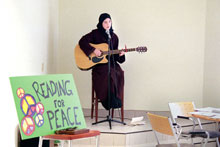Poetry reading draws peace seekers

Tegan Blackwood participates in the “Reading For Peace” poetry reading. Blackwood gave two musical performances at the event on Jan. 24. The reading consisted of numerous forms of poetry, essays, commentary and different kinds of musical performances.
“As if in a dream, I picked up my rifle, put it on automatic, pushed the barrel into the Cong’s face and pulled the trigger,” said Dr. Steve Wagner, assistant professor of history, as he read in front of a gathering of students, faculty and community members Jan. 24 at the Seattle Roast Caffé.
“I saw his face disappear. I guess I blew his head off. But I never saw his body, and I did not look for it,”
Wagner’s piece, “Death in the Ladrang Valley” from a 1967 edition of The Saturday Evening Post, was one of many presented at the Reading for Peace. The gathering pulled in a variety of members from the community for an afternoon of poetry, essays and commentary on the subject of peace.
“It was really very satisfying to see the diversity of people that participated and the diversity of things they chose to read from,” said Jean Blackwood, an organizational member of the community group Peace Awareness. “It just goes to show you that peace is a very large idea. We weren’t just talking about the war against Iraq; we were talking on a much bigger scale than that.”
Readings ranged from poetry written by the speakers and thoughts from Albert Einstein to an essay on primate peacemaking.
“It emphasized that we think wrongly by thinking it is more natural for humans to make war rather than peace,” said Dr. Joy Dworkin, associate professor of English and event organizer, of the essay on primates.
Adorned in traditional Islamic dress with guitar in hand, Tegan Blackwood, Jean Blackwood’s home-schooled daughter, lent two musical performances to the event, which she claimed served as breaks between readings. Of the pieces she performed, the second was her favorite.
“The third verse where I talk about the boy who is in the army and how he is not fighting for some great ideal, he’s just fighting to make it through each day, shooting who gets in his way, I think most expresses how I feel about war,” Tegan Blackwood said.
She was not the only participant who lent music to the reading. Dworkin contributed her ability to play the mbira, an ancient tribal instrument, to provide exit music.
“The source of that music, which is very ancient, has to do with bringing the community together for purposes of healing, especially, and resolving problems,” Dworkin said.
Despite an anti-war sentiment, Dworkin said the reading was not specifically against war but open to different viewpoints.
“Even the people who believe that we need to take a military action ultimately want peace,” she said.
For William Dessenberger, freshman computer science major, the reading was an opportunity to gather more students in his fight for peace.
“The only thing that’s keeping people at this campus from demonstrating, acting and trying to stop the war is the simple fact that they don’t know that there are efforts out there,” he said. “They don’t know that there’s anything they can actually do.” Dessenberger gathered information from students interested in an on-campus peace initiative.
The student peace club Dessenberger is helping set up, which will hold its first meeting at the Seattle Roast Caffé at 1 p.m. Saturday, is out to accomplish what he thinks the Reading for Peace helped — the visibility of the movement.
“The main thing is you have to be out there,” Dessenberger said. “You have to be there when people are driving to work. You have to be there when people are going to the mall, going to school. It has to be everywhere. You have to get out there once a week or more, just be in a populated place where people realize, ‘whoa, there’s someone standing over there and they’re against the war. Amazing, I’m not the only one.'”
Despite using the Reading for Peace to further his movement, Dessenberger explained the gathering was a much-needed form of relaxation for those who have been working for peace.
Your donation will support the student journalists of Missouri Southern State University. Your contribution will allow us to purchase equipment and cover our annual website hosting costs.



























